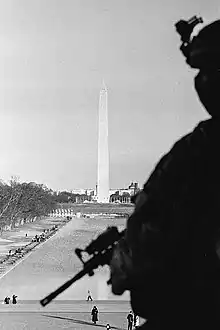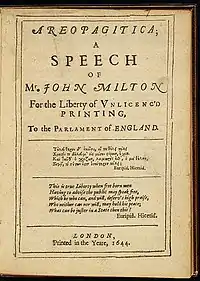Portal:Journalism
The Journalism Portal Kaiyuan Za Bao was an official publication which first appeared in the 8th century, during the Kaiyuan era. It has been described as the first Chinese newspaper or official gazette,[1] and also as the world's first magazine.[2] Pictured is a remake of the publication. .jpg.webp) The title page of Relation aller Fürnemmen und gedenckwürdigen Historien (Account of all distinguished and commemorable stories), from 1609. The publication is recognized by the World Association of Newspapers[3] as the world's first newspaper. Journalism is the production and distribution of reports on the interaction of events, facts, ideas, and people that are the "news of the day" and that informs society to at least some degree of accuracy. The word, a noun, applies to the occupation (professional or not), the methods of gathering information, and the organizing literary styles. The appropriate role for journalism varies from countries to country, as do perceptions of the profession, and the resulting status. In some nations, the news media are controlled by government and are not independent. In others, news media are independent of the government and operate as private industry. In addition, countries may have differing implementations of laws handling the freedom of speech, freedom of the press as well as slander and libel cases. The proliferation of the Internet and smartphones has brought significant changes to the media landscape since the turn of the 21st century. This has created a shift in the consumption of print media channels, as people increasingly consume news through e-readers, smartphones, and other personal electronic devices, as opposed to the more traditional formats of newspapers, magazines, or television news channels. News organizations are challenged to fully monetize their digital wing, as well as improvise on the context in which they publish in print. Newspapers have seen print revenues sink at a faster pace than the rate of growth for digital revenues. (Full article...) Selected article –.jpg.webp) Christgau's Record Guide: Rock Albums of the Seventies is a music reference book by American music journalist and essayist Robert Christgau. It was first published in October 1981 by Ticknor & Fields. The book compiles approximately 3,000 of Christgau's capsule album reviews, most of which were originally written for his "Consumer Guide" column in The Village Voice throughout the 1970s. The entries feature annotated details about each record's release and cover a variety of genres related to rock music. Christgau's reviews are informed by an interest in the aesthetic and political dimensions of popular music, a belief that it could be consumed intelligently, and a desire to communicate his ideas to readers in an entertaining, provocative, and compact way. Many of the older reviews were rewritten for the guide to reflect his changed perspective and matured stylistic approach. He undertook an intense preparation process for the book during 1979 and 1980, which temporarily hindered both his awareness of current music and his marriage to fellow writer Carola Dibbell, whom he later credited as an influence on his work. (Full article...)Selected image Faculty of Journalism of Moscow State University Faculty of Journalism of Moscow State University. A journalism school is a school or department, usually part of an established university, where journalists are trained. An increasingly used short form for a journalism department, school or college is 'j-school'. Many of the most famous and respected journalists of the past and present had no formal training in journalism, but learned their craft on the job, often starting out as copy boys/copy girls.
Did you know...
WikiProjects
What are WikiProjects?
Selected biography –
Pauline Kael (/keɪl/; June 19, 1919 – September 3, 2001) was an American film critic who wrote for The New Yorker from 1968 to 1991. Known for her "witty, biting, highly opinionated and sharply focused" reviews, Kael's opinions often ran contrary to those of her contemporaries. One of the most influential American film critics of her era, she left a lasting impression on the art form. Roger Ebert argued in an obituary that Kael "had a more positive influence on the climate for film in America than any other single person over the last three decades". Kael, he said, "had no theory, no rules, no guidelines, no objective standards. You couldn't apply her 'approach' to a film. With her it was all personal." In a blurb for The Age of Movies, a collection of her writings for the Library of America, Ebert wrote that "Like George Bernard Shaw, she wrote reviews that will be read for their style, humor and energy long after some of their subjects have been forgotten." Owen Gleiberman said she "was more than a great critic. She reinvented the form, and pioneered an entire aesthetic of writing." (Full article...)Original reportingIn the newsGeneral images -The following are images from various journalism-related articles on Wikipedia.
Selected quoteMain topicsSubcategoriesCategory puzzle Select [►] to view subcategories
Journalism Journalism by continent Journalism by country Journalism by field Journalists Journalism lists Works about journalism Types of journalism Journalism awards Journalism conferences Copy editing Criticism of journalism Crowdfunded journalism Journalism education Fact-checking websites Freedom of the press History of journalism Impact of the COVID-19 pandemic on journalism Interviews Investigative journalism Journalism adapted into films News media Newswriting Journalism occupations Journalism organizations Press galleries Reporting specialties Sources (journalism) Journalism standards Journalism terminology Journalism stubs Featured content
Featured articles
Featured listsGood articles
Featured pictures
Featured portalsThings you can do Things you can do
Related portalsAssociated WikimediaThe following Wikimedia Foundation sister projects provide more on this subject:
Sources
Discover Wikipedia using portals
| ||||
.jpg.webp)
.jpg.webp)

.jpg.webp)

.jpg.webp)















.png.webp)




































%252C_1896.jpg.webp)
.jpg.webp)








_cover.jpg.webp)



_-_Restoration.jpg.webp)





